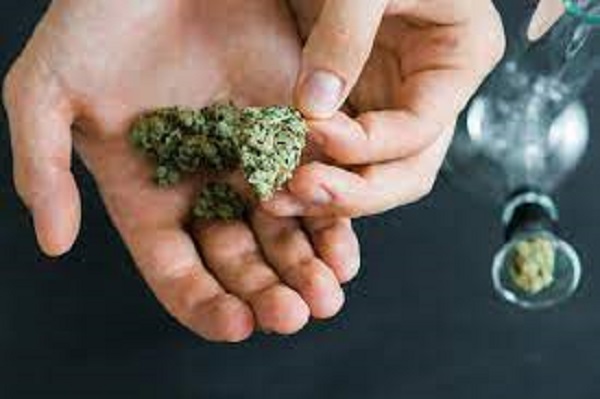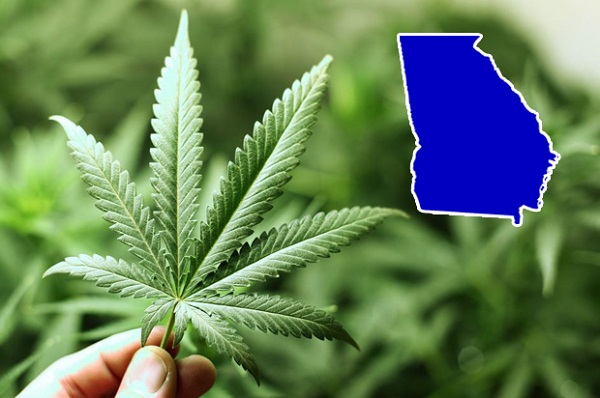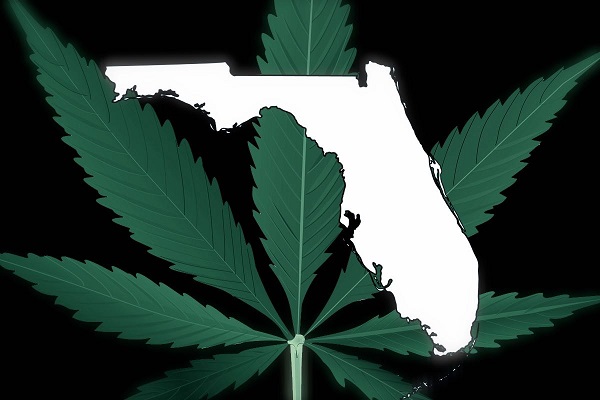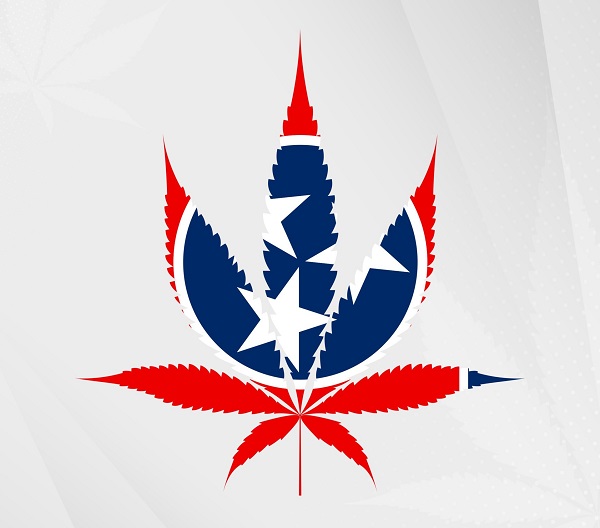Opinions about marijuana use vary — with differing points of view about its social acceptability, risks and benefits, its use as a recreational drug, and whether it can be helpful in treating disease or not.
However, marijuana use, especially over a long period of time, can lead to problematic use and marijuana use disorder. In fact, people who start using marijuana before age 18 are 4 to 7 times more likely to have a marijuana use disorder than adults.
People who use marijuana frequently and regularly and then try to quit can experience withdrawal symptoms. Cannabis withdrawal can make it difficult to stop using marijuana, but recovery is achievable. Continue reading to better understand marijuana withdrawal, including symptoms and duration, and how treatment can help you successfully stop using marijuana.
What is Marijuana Withdrawal?
People who use marijuana, also known as cannabis, weed, Mary Jane, and ganja, among other names, may take it to experience the feelings of relaxation, euphoria, and enhanced sensory perception often associated with the drug. However, regular use of marijuana, such as daily or several times a week, largely means that withdrawal symptoms can occur when a person tries to drastically reduce or stop marijuana use altogether.
A meta-analysis of studies of more than 23,000 participants found that 47% of participants who used marijuana experienced cannabis withdrawal on a regular basis. Although cannabis withdrawal does not come with a high risk of serious side effects, withdrawal can interfere with abstinence and lead to relapse, as re-introduction of marijuana immediately alleviates unpleasant withdrawal symptoms.
Marijuana Withdrawal Timeline
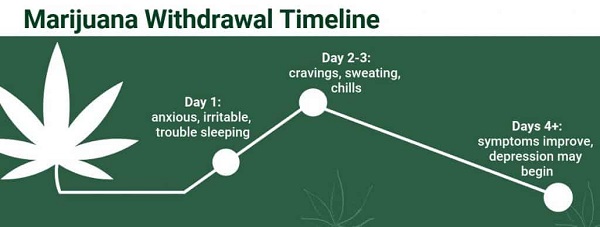
People who are trying to significantly reduce their use of marijuana or quit completely after heavy regular use, face acute withdrawal symptoms which can appear relatively quickly:
- Most withdrawal symptoms usually begin within 1-2 days.
- Within 2-6 days, symptoms reach a peak of severity.
- Within 3 weeks, the most acute symptoms disappear.
Sleep problems tend to be the most frustrating for people in the early days of marijuana abstinence and are the reason many return to marijuana use. These sleep disturbances, including insomnia and strange dreams, may persist for 30 to 45 days after stopping marijuana use.
Symptoms of Marijuana Withdrawal
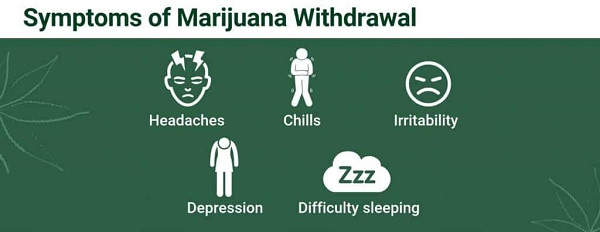
Cannabis withdrawal syndrome, the official diagnosis listed in the Diagnostic and Statistical Manual of Mental Disorders, can occur in people who stop using cannabis after heavy, long-term use. Marijuana symptoms may include:
- Anger, irritability, and aggression.
- Feelings of nervousness and anxiety.
- Restlessness.
- Decreased appetite or weight.
- Depression.
- Insomnia.
- Experiencing strange or unsettling dreams.
- Headaches, nausea, vomiting, sweating, and abdominal pain.
- Tremors.
The presence of 3 or more of these symptoms within one week of reducing marijuana use indicates cannabis withdrawal.
Causes of Marijuana Withdrawal
Quitting marijuana can vary from person to person.
According to the Diagnostic and Statistical Manual of Mental Disorders, Fifth Edition (DSM-5), marijuana withdrawal tends to be more common and more difficult among adult drug users than among adolescent drug users. This is likely due to the fact that adults tend to use marijuana more frequently and in greater amounts than teenagers.
Multidrug use (use of multiple substances) may also play a role in marijuana withdrawal. Studies show that concomitant use of tobacco, alcohol, and other substances with marijuana may increase the likelihood of withdrawal symptoms. On the other hand, opioid addicts who also use marijuana are less likely to experience cannabis withdrawal.
Marijuana withdrawal symptoms may be more severe in people using more potent marijuana. Studies show that people who engage in “dabbing,” a process in which marijuana with very high levels of tetrahydrocannabinol (THC) is vaporized and inhaled through a vape pen, report more intense withdrawal symptoms. -80% THC; typical THC content is 2%-6%.
In addition, people with affective, anxiety, and personality disorders, as well as those who suffer from post-traumatic stress disorder (PTSD), are more likely to experience more severe withdrawal symptoms than those who do not have these psychiatric disorders.
Moreover, the severity of the withdrawal syndrome may correlate with the risk of relapse. For example, adolescents who meet the diagnostic criteria for cannabis withdrawal are more likely to relapse earlier than those who do not.
How to treat or prevent cannabis withdrawal?
If you’re ready to quit smoking, talk to your doctor or a substance use disorder specialist about your options. You may not need special instructions, but it’s always a good idea to consult with someone about your decision. At the very least, this person can be a good source of inspiration and responsibility.
If you have been a regular and frequent smoker, cutting back and phasing out your cannabis use can help make life easier without cannabis. If you have only used marijuana occasionally, you may be able to quit smoking completely without any reduction.
Tips for quitting
Withdrawal symptoms are different for everyone. They also vary in severity depending on the duration of cannabis use.
Although withdrawal symptoms can be unpleasant, they are usually not dangerous compared to alcohol or opioids withdrawal, which can be life-threatening. For a person who uses cannabis daily, slowly reducing use can make it easier to stop smoking. If a person only occasionally uses cannabis, they may be able to quit completely.
If a person is ready to quit using cannabis, they should take care of their body during the peak withdrawal period during the first week. Try to relieve your withdrawal symptoms by using the following methods:
- Eat a varied diet that contains plenty of fruits and vegetables. Sugar and junk food can make a person feel worse.
- Drink plenty of water to stay hydrated. Caffeinated beverages might make symptoms worse.
- Get plenty of sleep to allow the body to rest.
- Try to get some exercise each day to stay active.
- Get support from family and friends for motivation and accountability.
Negative effects of marijuana
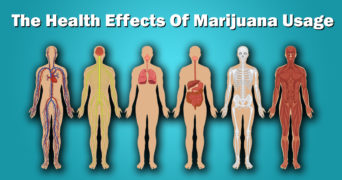
Research has linked cannabis use to numerous negative health effects, according to the CDC. These include memory problems, an increased risk of stroke and heart disease, lung problems from smoke, and mental health symptoms such as anxiety and paranoia.
The National Institute on Drug Abuse says there is substantial evidence from both animal and human studies that cannabis exposure early in life can lead to cognitive impairments such as problems with memory, learning and altered reward systems in the brain.
Summary
Although withdrawal symptoms from cannabis may not be as severe as from some other substances, such as cocaine or heroin, cannabis withdrawal is real. Smoking cannabis can increase addiction. You may experience symptoms such as trouble sleeping, mood swings, and irritability when you stop.
These symptoms are rarely dangerous and most disappear within about 72 hours of the last cannabis use. In the long term, it is recommended that you find guidance and accountability from a therapist or support group. Staying sober is easier when you know that people are supporting you.

